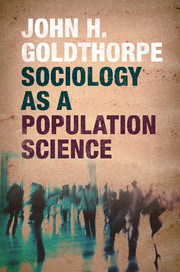Book contents
- Frontmatter
- Dedication
- Contents
- Acknowledgements
- Introduction
- 1 Sociology as a population science: the central idea
- 2 Individual variability in human social life
- 3 The individualistic paradigm
- 4 Population regularities as basic explananda
- 5 Statistics, concepts and the objects of sociological study
- 6 Statistics and methods of data collection
- 7 Statistics and methods of data analysis
- 8 The limits of statistics: causal explanation
- 9 Causal explanation through social mechanisms
- Conclusion
- References
- Index
Conclusion
Published online by Cambridge University Press: 05 December 2015
- Frontmatter
- Dedication
- Contents
- Acknowledgements
- Introduction
- 1 Sociology as a population science: the central idea
- 2 Individual variability in human social life
- 3 The individualistic paradigm
- 4 Population regularities as basic explananda
- 5 Statistics, concepts and the objects of sociological study
- 6 Statistics and methods of data collection
- 7 Statistics and methods of data analysis
- 8 The limits of statistics: causal explanation
- 9 Causal explanation through social mechanisms
- Conclusion
- References
- Index
Summary
In this concluding chapter, I do not aim to summarise what has gone before. I noted in the Introduction that readers wanting an overview of the argument of the book could simply read through the propositions with which the central chapters are headed. I hope that those who at this stage feel in need of some recapitulation might find it sufficient to do likewise. What I wish to consider here is what might be thought to follow if my case for an understanding of sociology as a population science were to be accepted. More specifically, I am concerned with the implications for sociology itself as an academic discipline, for its relations with other disciplines and for its public role.
For sociology as a discipline, what would perhaps most obviously follow insofar as it became understood as a population science is that the scope to which it presently pretends would be significantly reduced. That is to say, in taking population regularities as its proper explananda, in focusing on establishing the extent and form of such regularities through statistically grounded methods and on developing and testing mechanism-based explanations of their generation and persistence, there is no question that sociology would address a narrower range of topics, through less diverse research styles and with a more limited conception of its ultimate goals than is presently the case. Abbott (2001: 5–6) has observed that sociology ‘is not very good at excluding things from itself’ and that ‘once an area makes a claim for sociological attention, the discipline doesn't have any intellectually effective way of denying that claim’ (emphasis in original). Sociology as a population science would have such a way, that is, in being based on a relatively clear definition of what are, and are not, its appropriate objects of study – and of what are in turn its appropriate methods of data collection and analysis and modes of explanation. From this point of view, to echo Mies van der Rohe, less would be more.
However, it is, I recognise, on the grounds that it would imply a clear diminution of the extent and diversity of the sociological domain that the idea of sociology as a population science is most likely to be disputed and resisted. In anticipation of such a reaction, I might then restate a point that I already emphasised in the Introduction.
- Type
- Chapter
- Information
- Sociology as a Population Science , pp. 126 - 140Publisher: Cambridge University PressPrint publication year: 2015



